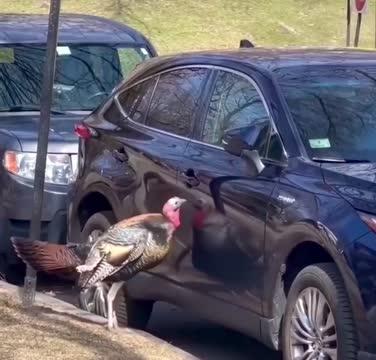
Turkey-related damage American insurance companies occasionally include a specific clause for “turkey-related damage” in their policies — a quirky but very real provision that reflects unusual claims arising from encounters with these large, sometimes aggressive birds. Turkeys, like many birds, can become agitated or territorial when they see their own reflection in shiny surfaces — such as car bumpers, windows, or polished metal. Mistaking their reflection for a rival, they may repeatedly attack the surface, causing scratches, dents, or broken glass. Homeowners and vehicle owners have reported turkeys pecking at mirrors, charging at garage doors, or even damaging siding and trim. When damage is caused by domestic or wild poultry — including turkeys — standard liability or property insurance policies often contain exclusions or coverage limits. Many insurers categorize birds alongside “vermin, rodents, and insects” as excluded perils, meaning damage caused by these animals may not be covered unless specifically added. Some policies may exclude all animals unless an endorsement (a formal amendment to the policy) is purchased to extend coverage. In rural and suburban areas — particularly in New England and parts of the Midwest — wild turkey populations have rebounded dramatically since the 1970s due to conservation efforts. As a result, human-turkey conflicts have increased. While turkeys are generally not dangerous, large males (toms) can become aggressive during mating season, chasing people, pets, or vehicles — and sometimes causing property damage in the process. Interestingly, turkey hunting is a popular and highly regulated seasonal activity across the United States. Most states have designated spring and/or fall turkey hunting seasons, requiring hunters to obtain special permits and follow strict bag limits. Hunters often use decoys, calls, and camouflage to attract turkeys — practices that highlight the birds’ territorial and social behaviors. Despite being hunted, wild turkeys remain abundant and adaptable, frequently appearing in backyards, parks, and even urban neighborhoods — which is precisely why insurers have had to adapt their policies to account for “turkey trouble.” In summary: while “turkey damage” may sound humorous, it’s a legitimate concern for insurers and policyholders alike. Always review your policy’s exclusions and consider adding endorsements if you live in an area with active turkey populations — especially during spring, when these birds are most territorial and likely to cause mischief.
Post: 23 September 00:25